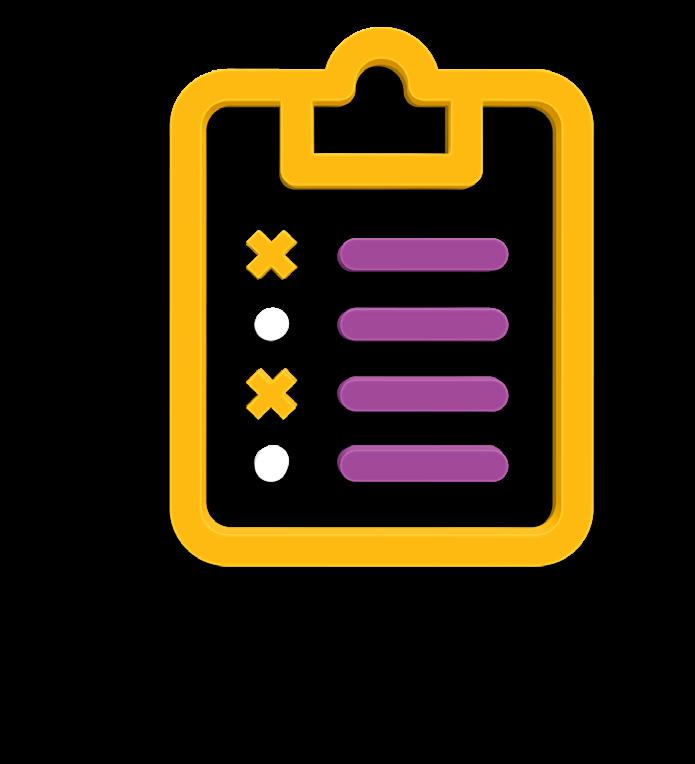WORKBOOK
Practical exercises
POKER
Proven and e ective note making system

WORKBOOK
Practical exercises
POKER
Proven and e ective note making system
METHODOLOGY theory and practice
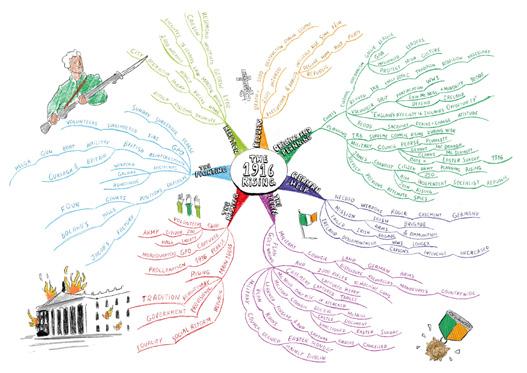
STUDY PLANNER designed to help students increase their productivity


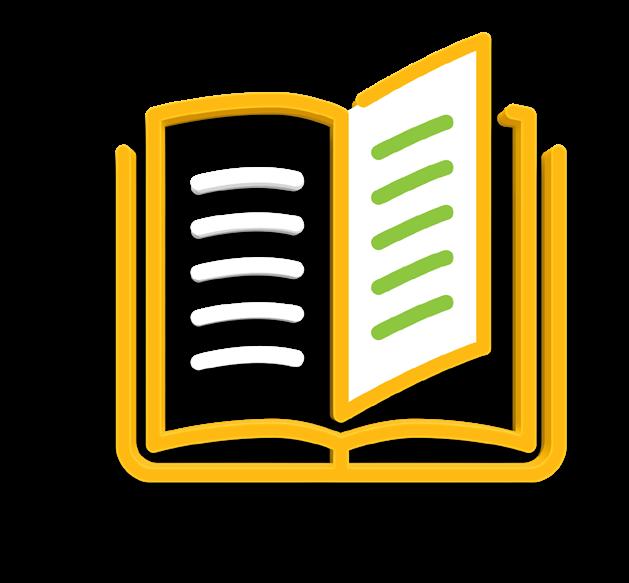
What is the best study advice you have been given, and why?
Were you ever given study advice that didn’t work, and why?
This exercise will help you determine the type of mindset you are inclined to have. Read through the following statements and indicate to what extent you would agree or disagree.
Which mindset do you have?
1. You have a certain amount of intelligence, and you can’t really do much to change it.
Agree Maybe Disagree
2. No matter who you are, you can significantly change your intelligence level.
Agree Maybe Disagree
3. You can learn new things, but you can’t change your underlying level of intelligence. Agree Maybe Disagree
4. Learning new things can increase your underlying intelligence.
Agree Maybe Disagree
5. Talent is something you’re born with, not something you can develop.
Agree Maybe Disagree
6. If you practise something for long enough, you can develop a talent for it.
Agree Maybe Disagree
7. People who are good at a particular skill were born with a higher level of natural ability. Agree Maybe Disagree
8. People who are good at a particular skill have spent a lot of time practising that skill, regardless of natural ability. Agree Maybe Disagree
9. You can always substantially change how much talent you have.
Agree Maybe Disagree
10. You can learn new things, but you can’t really change your basic level of talent.
Agree Maybe Disagree
SUPERCHARGE YOUR STUDY WITH THE POKER STUDY
OverviewKeywords
SUPERCHARGE YOUR STUDY WITH THE POKER STUDY SYSTEM

Highlight the keywords for the topic.
Read your text again and pick out the keywords you need to remember. Keywords
Etch & Sketch
are the
?
Draw a mind map that uses the headings and keywords.
OverviewKeywords Etch & Sketch Retest
headings and keywords.
Draw a mind map/one-page summary that uses the headings and keywords.
What do I now know about the topic?
What do I now know about the topic?
Fighting Defensive positions

Four courts, Jacob’s Factory, Boland’s Mills
Incidents Wexford, Galway Ashbourne
British reinforcements Curragh & Britain, artillery, gun Boat Helga GPO fire Volunteers surrendered Pearse Surrender Sunday Reaction Unionists disloyal attack Home Rulers insult; angry destrucution of city British Martial law15 leaders executed, 2,000 interned Llyod George negotiate Redmond V.s Carson
Death 5000 Destruction centre Dublin 2,500 injured Executions & Arrests influence rise Sinn Fein Decline Home Rule Party Republic
Needed weapons. Roger Casement Germany MissionIrish brigade + arms & ammunition Failed Irish brigade. 1 shipload arms
Ireland disappointment WW1longer, Carson’s influence increased
The Plan Military Council land German Arms distribute volunteers manoeuvres countrywide Plan Goes Wrong Aud 2,000 rifles 10 machine guns captured Kerry Casement captured Tralee MacNeill only rise if attacked
Cultural nationalism: Gaelic League GAA influenced leaders
Protect Irish culture
C.
IRB: early 20th
Revived
Tradition rebellion necessary Volunteer split: participation in WW1
Eoin MacNeill + Minority 10,000 defend Ireland
“England’s difficulty is Ireland’s Opportunity”
Blood Sacrifice: Deaths change attitude Planning IRB Supreme councilrising during war
Military council deceive MacNeill Castle Document –sanctioned Easter Sunday Learned forgery & Aud capture orders cancelled Plan ruins
Military council –Pearse, Plunkett, Ceannt, MacDonagh, Clarke, Mc Dermott
Military council decided Easter Monday –mainly Dublin
Date = Easter Sunday 1916 James Connolly Citizen Army planning rising 250 aim independent socialist republic Join rising Secrecy: previous attempts spies
citizen Army Liberty Hall
The Rising 1,600 volunteers 200
Captured GPO headquarters
Pearse 1916 Proclamation Main IdeasRising = revolutionary tradition, provisional government, republic, social reform & equality
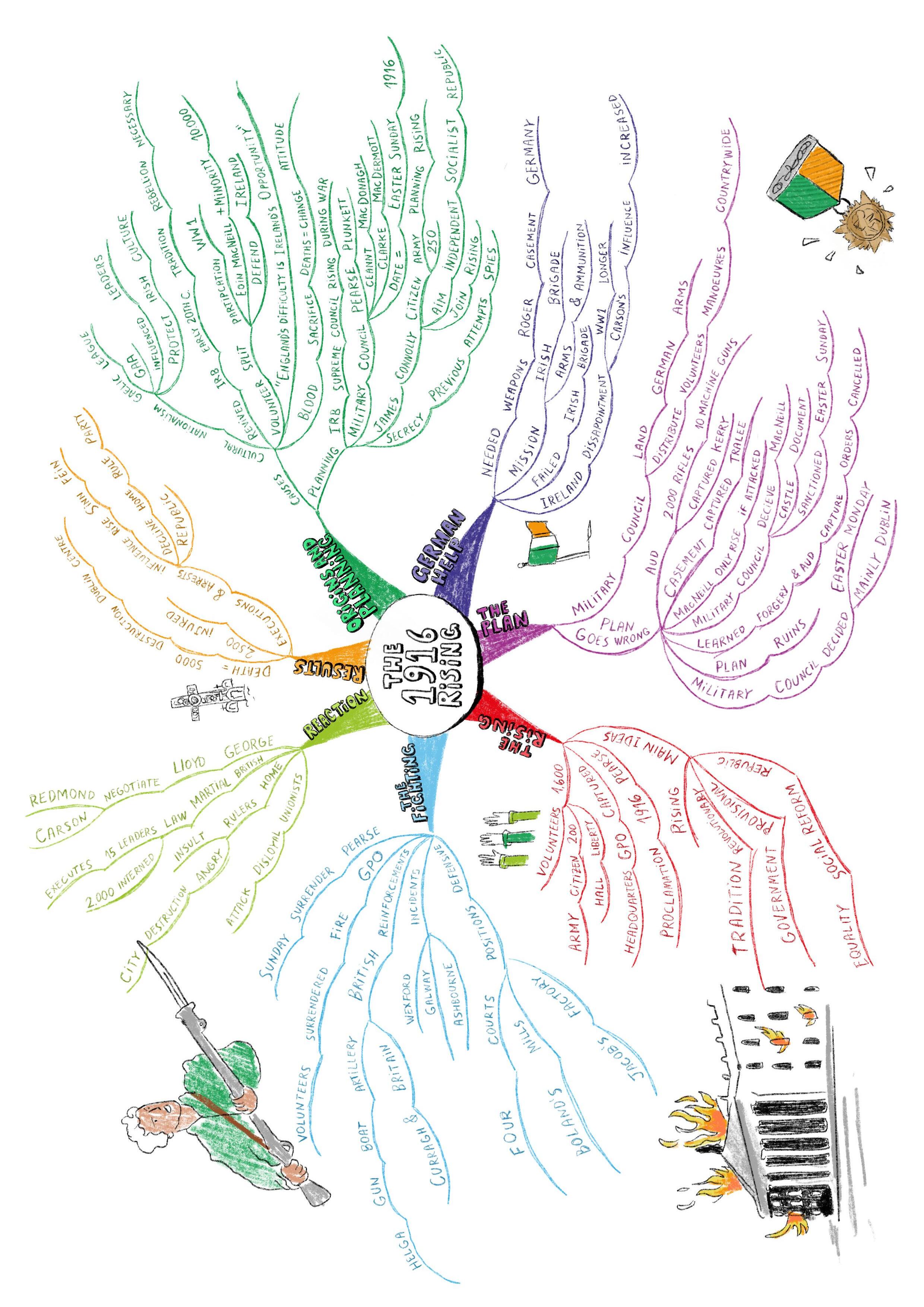


Some students feel they need to know every little detail of every section of every subject to be really prepared for the exams. This is not so!
Ploughing through piles and piles of books and notes is not efficient use of study time. Instead, your past papers should become your best friend. You should be totally familiar with the structure and layout of each paper.
Studying is what you do to help you remember and prepare for assessments.
When you decide to sit down and study, you will need the most effective tools to organise and recall information for the exams. In the next few pages we have provided a step-by-step guide for studying using the best tools.
It is important that you identify which topics you need to study in each subject.
Organise your notes for each topic using the ‘POKER’ study system.
Once you have followed the POKER system, file your new one-page summaries or mind maps for each topic in an organised folder. You may have an individual folder for each subject or alternatively a larger folder with subdividers for each subject.
POKER is a simple 5-step methodology which you can use to create notes on any topic you wish to study.
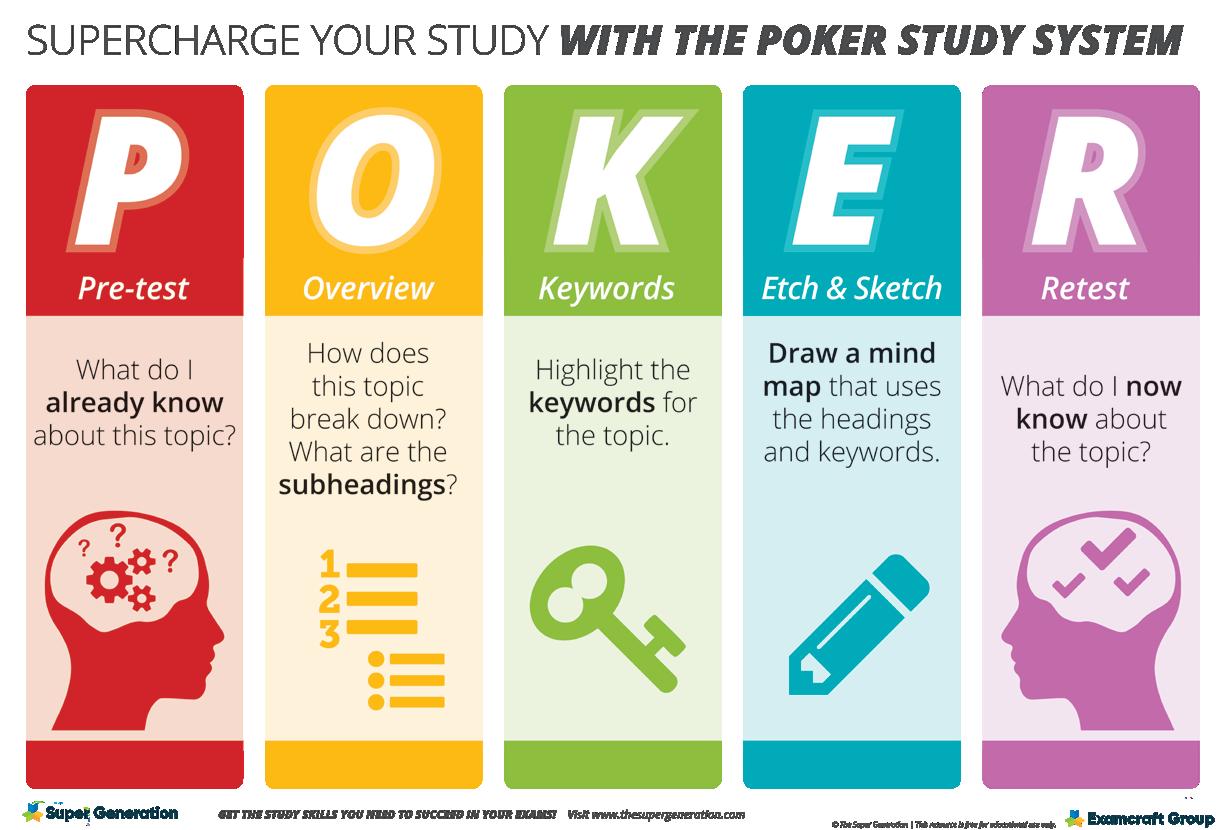
There is a worked example in Science for the Junior Cycle and English for the Leaving Certificate.
(In the workbook section, you will be brought through a worked example for the 1916 Rising, from Senior Cycle History)
Pre-test
Your first task is to focus your mind on what you are about to study by quickly finding out how much you already know about the topic. Simply take a piece of paper and write down everything you think you know about the topic, do not worry about whether it is right or wrong or even in the correct order at this stage.
Overview
Go to your book and class notes you already have for this topic, and pick out the main headings. They may be divided into different subtitles and subheadings. Take note of them all so you have a good idea of how this topic is divided up. You are giving your brain a structure to what you are trying to learn.
Keywords
This is where you select all the relevant and important keywords using a highlighter. Don’t just read it, actively read it! Pick out the good stuff and leave the rest behind! The important thing is that you are highlighting the words important to understanding this topic. For example, words such as ‘was’, ‘so’ or ‘about’ are not as important, you don’t need to learn them.
Once you have your keywords, it’s time to put them into note form. Notes can be recorded in many different ways. Colour and images help us to remember notes. For example, creating a mind map will help you retain a lot more information. It is easier for your brain to remember information when it is in the form of a mind map.
Retest
When your mind map is complete, memorise the key points from it. Then retest yourself on this mind map to see if you know it. If you’re having trouble memorising the key points, why not try a memory technique like the example given below?
Now that you have created your notes in the form of a one-page summary, you have this knowledge of the topic in your short-term memory.
BUT it won’t be there forever, it’s up to you to review it and make sure the knowledge goes into your long-term memory.
Why do we find it so easy to remember things like our parents’ names or our phone number?
The reason is because we use them so often that they are implanted in our long-term memory. Wouldn’t it be great if what we needed to know for the exam was that easy to remember?
When you learn something new in class, you may forget about 50% of it by the time you go home. This forgetfulness is normal but highlights the importance of regular review.
The chart shows how your recall (memory) diminishes over time and how regular review enhances recall.
Without review you are lucky to remember 10% of what you have learned after the first three months. This explains why many people get poor results in their exams or can’t remember the name of a person after meeting them just once. However, if you review the material on a regular basis, you dramatically increase your recall (memory).
To help with your regular reviews and to learn faster, we have created the 5 x 5 Review System. This requires you to review your notes five times in 5-minute sessions. The first time you create a one-page summary using the POKER system and then you review the topic five times.
IDEALLY, YOU COULD REVIEW EACH TOPIC AS FOLLOWS:
» After 1 Hour
» After 1 Day
» After 1 Week
» After 1 Month
» After 3 Months
The best way to record your study is at the end of each study session. Our Subject Study Planner allows you to plan your study, record your study sessions and track your own progress. Use the following step-by-step guide to use our Subject Study Planner on page 34:
Fill in the subject title for each of your subjects.
Break each subject into topics (look at your books, exam papers and speak to your teachers about the topics).
Indicate the importance of each of the topics for the exam (look at past exam papers and speak to your teachers).
Record your study session on the Subject Study Planner with the date the mind map was created on.
Plan to review the topic after 1 hour, 1 day, 1 week, 1 month and 3 months to commit to your long-term memory. Record each session in your Subject Study Planner.


